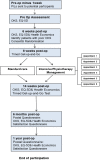Targeted rehabilitation to improve outcome after total knee replacement (TRIO): study protocol for a randomised controlled trial
- PMID: 24484541
- PMCID: PMC3911957
- DOI: 10.1186/1745-6215-15-44
Targeted rehabilitation to improve outcome after total knee replacement (TRIO): study protocol for a randomised controlled trial
Abstract
Background: Approximately 20% of patients are not satisfied with the outcome of total knee replacement, great volumes of which are carried out yearly. Physiotherapy is often provided by the NHS to address dysfunction following knee replacement; however the efficacy of this is unknown. Although clinically it is accepted that therapy is useful, provision of physiotherapy to all patients post-operatively does not enhance outcomes at one year. No study has previously assessed the effect of targeting therapy to individuals struggling to recover in the early post-operative phase.The aim of the TRIO study is to determine whether stratifying care by targeting physiotherapy to those individuals performing poorly following knee replacement is effective in improving the one year outcomes. We are also investigating whether the structure of the physiotherapy provision itself influences outcomes.
Methods/design: The study is a multi-centre prospective randomised controlled trial (RCT) of patients undergoing primary total knee replacement, with treatment targeted at those deemed most susceptible to gain from it. Use of the national PROMS programme for pre-operative data collection allows us to screen all patients at initial post-operative clinical review, and recruit only those deemed to be recovering slowly.We aim to recruit 440 patients through various NHS orthopaedic centres who will undergo six weeks of physiotherapy. The intervention will be either 'intensive' involving both hospital and home-based functional exercise rehabilitation, or 'standard of care' consisting of home exercises. Patients will be randomised to either group using a web-based system. Both groups will receive pre and post-intervention physiotherapy review. Patients will be followed-up to one year post-operation. The primary outcome measure is the Oxford Knee Score. Secondary outcomes are patient satisfaction, functional ability, pain scores and cost-effectiveness.
Trial registration: Current Controlled Trials ISRCTN23357609. ClinicalTrials.gov NCT01849445.
References
-
- Seventh Annual Report. Seventh Annual Report. http://www.njrcentre.org.uk.
Publication types
MeSH terms
Associated data
Grants and funding
LinkOut - more resources
Full Text Sources
Other Literature Sources
Medical


